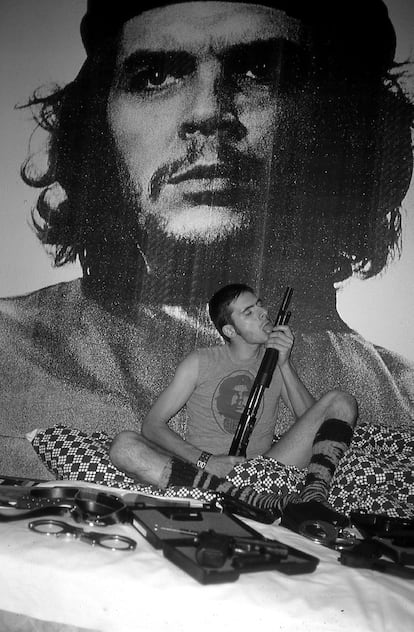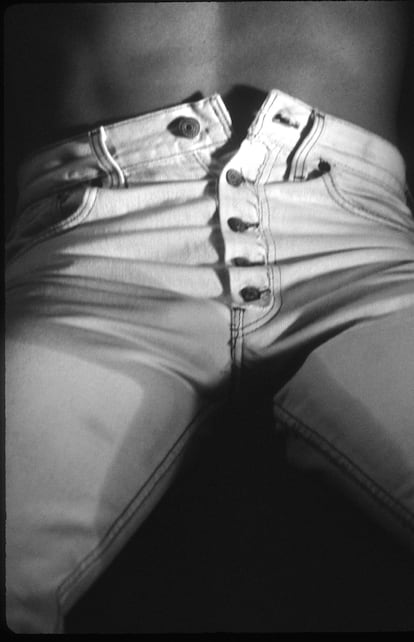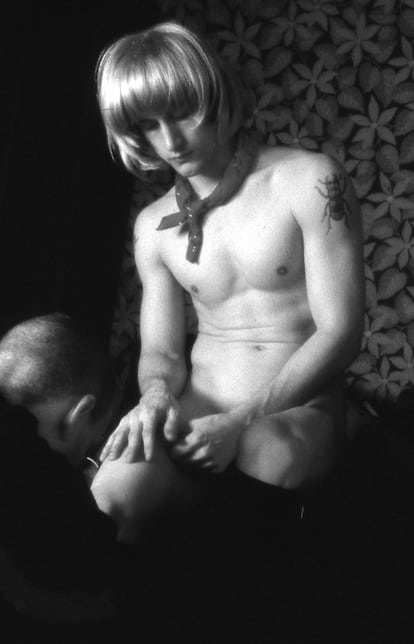Bruce LaBruce, the philosopher of porn: “Pornography can be art”

Justin Stewart (Toronto, 61) didn't discover sex by sneaking into an X-rated movie theater as a teenager or flipping through a Playboy magazine under the sheets. Stewart, better known as Bruce LaBruce , discovered sex in a more poetic and literary way. “In the 1970s, when I was a kid, my brothers were already in college and would bring home books like Tropic of Cancer by Henry Miller or Naked Lunch by William Burroughs. I liked to steal them to read the most obscene passages,” recalls the transgressive filmmaker, photographer, and writer in a telephone conversation with EL PAÍS. “I've always had a very morbid interest in sex,” adds LaBruce, world-famous for his gorn films and images, a fusion of gore and porn.
LaBruce says that pornography , like masturbation, is something almost everyone indulges in, but no one wants to talk about. He, on the other hand, has spent over 40 years building a persona, an artistic career, and a corpus of works exclusively about porn. He's outspoken about sex and his own sex life. What's more, he's always willing to share details. "I grew up on a small farm, surrounded by animals. My father was a farmer, who raised and hunted. So I grew up watching him kill animals and breed them. We had a huge bull. I spent my childhood watching that bull fuck with his huge penis. It was quite pornographic," he says. That might explain the large doses of violence and explicit sex in his work, a mix of independent film techniques and gay pornography that abounds with marginalized characters such as skinheads , punks, and sadomasochists.
The Canadian artist approaches pornography as a tool for analysis and social critique. He is now publishing his Porno Diaries in Spain. How to Succeed in Hardcore Without Even Trying (Editorial Cántico), a collection of short texts in which he reflects on the explicit representation of sex and queer identity and their relationship with politics and capitalism.
His entire body of work borders on the border between art—his work has been exhibited and is part of the MoMA collection in New York—and marginality—his feature film LA Zombie was banned in Australia in 2010—between controversy— Otto, or Up With Dead People was one of the most controversial films at the Sundance and Berlin film festivals in 2008—and scandal—his photography exhibition Obscenity was attacked by Molotov cocktails in Madrid in 2012. He, who defines himself as a radical leftist, a queer Marxist punk, has always felt comfortable with dualities and provocation. Age has not tamed him. His latest film, The Visitor , revisits and pays homage to Pasolini 's Teorema , a 1968 film that delves into the home of a bourgeois family shaken by the arrival of a mysterious visitor. In his version, a refugee is the one who literally turns a wealthy family upside down.

Question: You've been arguing all your life that pornography can be a political act, a form of protest. How is that possible?
Answer: For me, porn is political because I initially used it to draw attention to what it means to be gay and what it means to be queer . The homophobic right is very honest about hating us. They don't hide it. And the left is tolerant of gay people, as long as we behave and don't cause scandals or be sexually radical. I started making my films as a form of protest against those two tendencies. I started in the punk scene, a very radical left. Even in that scene, there was a lot of homophobia and misogyny. My female friends and I started making films centered on women, gay people, and queerness . We showed homosexual sex as a challenge, with one premise: if you're so progressive and subversive, you should be able to handle watching a little anal sex.
Q. In Porno Diaries you say that you no longer watch porn.
A: Well, I think I should correct myself. I do watch porn, but I don't follow it. I don't know who the latest stars are, nor am I up to date with the latest industry news. I also don't subscribe to porn sites. I do consume pornography daily as part of my sexual life, although I also find inspiration in other images. For example, I hate sports. I have that in common with John Waters . But if I watch any sport on television, I consume it as porn. I also find inspiration in certain mainstream cinema, like the films of Lars von Trier , and even a fashion show. Anything can be porn if you put your mind to it.
Q. Porn is normalized now. It's everywhere: in advertising, on social media, in music videos. Is that a positive or negative thing?
A. It's both positive and not positive. There's a lot of schizophrenia in the contemporary world regarding sex, pornography, and explicit sexual images. You can clearly see it in fashion. Now, celebrity styles are heavily influenced by strippers and prostitutes. Big brands have taken over this marginalized aesthetic, and celebrities wear as little clothing as possible. But on the other hand, these same celebrities say they don't want to do sex scenes or that they don't want to be sexually objectified. There's a new wave of puritanism sweeping across the entire culture, even among younger people. There's an anti-sex, anti-sex movement, and at the same time, pornography has taken over everything: fashion, pop culture, television series...
Q. In this hypersexualized society, do we have more or less sex?
A. Everyone says that the new generations are less sexual or less interested in sex. I think they're more afraid of intimacy than of sex. There's also a worrying, almost biblical, conservative tendency that argues that sex should only be practiced for reproduction. We already know where that leads: more men hiring prostitutes. Or rather, more men paying other men for sex.

Q. You say that capitalism exploits us and uses all its resources to distract us from our sexual needs. How can we fight this capitalist mechanism?
A: It's the eternal question. Porn allows us to become aware of our repressed sexual urges in a way that I consider healthy. It invites us to recognize those urges and indulge or satisfy them, almost therapeutically. There's a lot of shame surrounding porn and recreational sex. Critics say it desensitizes people to the emotional aspects of sex . I disagree, at least when it comes to gay sex. Sex itself can be very personal and intimate. It's easier for gay people to compartmentalize and say, "Now I'm going to have sex just for pleasure." I've been going to gay saunas for many years. In fact, I met my husband and one of my longest-term partners in a sauna.
Q. In your book, you claim that pornography can be art. Do you really believe that?
A. For me, all pornography is art because there's a creative effort and creative people behind it. Even if it doesn't have an artistic intention, pornography can be art. That's not even counting the lighting and sound technicians, the editors, and a lot of people who also work in mainstream cinema. In fact, at first, the people who made porn films worked in mainstream cinema. Porn can be good or bad art, but ultimately, it's art.
Q. Now, with new technologies, everyone can be a porn star or direct an X-rated movie. OnlyFans is the best example .
A. With OnlyFans, people get very creative. On that platform, it's all about building your own brand, your persona, and your audience—creating a world that attracts followers. I think it's very creative and has democratized porn. Before, only those with a camera and the right equipment could create pornography. Now, a mobile phone is enough.
Q. Is there more creativity on OnlyFans than in the mainstream porn industry?
A. You could say yes. OnlyFans has liberated many actors and actresses. Now many of them feel they can be themselves and no longer have to give their money to agencies or intermediaries. There's a more artistic, more experimental porn movement, more democratic in terms of the types of bodies shown, the genres, and the styles. For me, all of this has legitimized the idea of porn as a creative endeavor.

Q. Are there more women directing and producing?
A. Absolutely. In the 1980s, there were only Candida Royalle and Annie Sprinkle, two female pioneers of porn. Now, there's a lot of independent porn cinema made by women. I worked four times with Erika Lust 's company. Erika is in Barcelona and runs an ethical and feminist porn company that makes films from a female perspective : made by women, starring women, and challenging the representation of women.
Q. The main argument of those who oppose adult films is sexual exploitation.
A. I've always maintained that there's a lot of exploitation in pornography . Porn tends to attract people who've had some kind of sexual trauma in their lives, and in the mainstream industry, there are many people willing to take advantage of that, to exploit that. It's now more regulated in terms of consent, monitoring, and screening for sexually transmitted diseases. But abuses continue to occur, as in any industry.
Q. You say we gays have become as boring as heterosexuals. Has the community become more conservative?
A. My worst fears have come true. When you distance yourself from the most radical, most advanced, most perverse, and most politically subversive people in the gay world, you betray the roots of the movement led by those people: trans women, leather workers, fetishists, and all the people who challenge ideas of monogamy, marriage, and so on. It was a mistake to become so conventional and complacent. Homophobia is on the rise, and we are losing rights due to the rise of a conservative, authoritarian movement sweeping across the Western world. Perhaps it's time for the forgotten radicals who fought for our rights to return.
Q. You are particularly critical of a very current phenomenon: that of gays who want to be part of conservative institutions that reject them and who adopt family values of marriage and children.
A. That's right. But the assimilation phenomenon isn't new. It's always happened. Look at the case of Roy Cohn. He was a gay lawyer who became McCarthy's right-hand man to persecute homosexuals and communists within the United States government . Cohn was also Donald Trump's mentor. Many of Trump's policies come from Roy Cohn, an openly gay man and fetishist. The gay liberation movement of the 1970s was very left-wing, progressive, and aligned with the feminist and Black movements. They all fought against imperialism, against economic and social inequality. Now we're very far from all that, so far that being gay is no longer even a reliable indicator of progressivism. Look at the example of Caitlyn Jenner . She's the biggest defender of Trump and the MAGA movement. Despite everything, there are people in the trans community who defend or support her just for being trans. That's a huge mistake.

Q: Women have been objectified for centuries. But I have the impression that men are now being objectified as well.
A. This has been going on since the 1970s, since the second wave of feminism. There's an episode of The Mary Tyler Moore Show in which Mary starts dating a very handsome ski instructor, a hot guy, but not very bright. Everyone criticizes her for sleeping with this man. Then she says, "Men have been doing this for centuries. It's about time we turned the tables and made them objects."
Q. We've also been talking about the vindication of non-normative bodies for years, but now normative bodies are once again holding sway in our culture. What's happening?
A. Five or seven years ago, there was a moment when we really saw a difference on the runways and in culture. For a moment, we really became aware of non-normative bodies. Even Karl Lagerfeld included non-normative bodies in his shows. But in the current political and ideological climate, we've regressed, back to the opposite: to the guiltless glorification of super-thin people and the elevation of masculinity. We had a few years of excessive political correctness, and now there's a movement in the opposite direction, with people in fashion saying, "I'm going to do what I want, I'm only going to hire thin, white models for my next show." The left shot itself in the foot with its excessive political correctness. Maybe we'll find a balance in the future. But I suspect it's only going to get worse. The more authoritarian and fascist America becomes, the more resistance and revolution we'll see. The next four or five years will be interesting…
EL PAÍS



